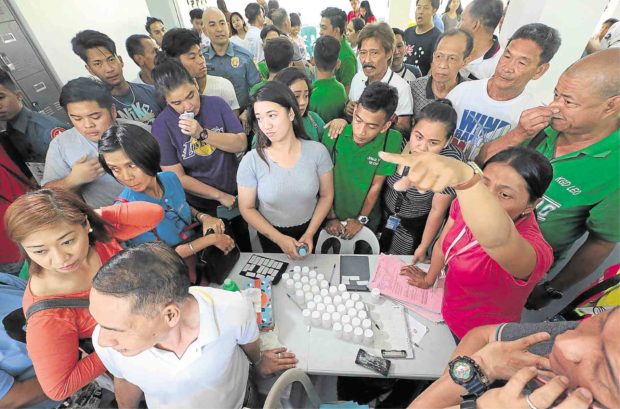
CHALLENGE ACCEPTED Barangay and Sangguniang Kabataan candidates in Quezon City wait for their turn to be tested for drugs after they took up the challenge of the Cubao police station for poll bets to submit themselves to drug testing.—GRIG C. MONTEGRANDE
Less than a week to go before the barangay elections on May 14, Metro Manila’s highest-ranking police officer said that he might end up giving a taste of “Tokhang” to candidates on the narcolist of the Philippine Drug Enforcement Agency (PDEA) who have yet to come forward.
National Capital Region Police Office (NCRPO) chief, Director Camilo Cascolan, told the Inquirer on Tuesday that only two Metro Manila officials on the list — which named 207 barangay officials suspected of involvement in illegal drugs — had appeared before him.
‘Tokhang’ author
Cascolan, the author of “Oplan Tokhang” when he was still the Philippine National Police’s director for operations, said he might need to pay the other officials a home visit and persuade them to join a rehabilitation program.
“If you don’t want to be insulted by a visit from me because you were on the list, it would really be better [for you to] talk to us,” he said.
Only 12 barangay officials named on the PDEA list were from Metro Manila, particularly Malabon, Caloocan, Manila, Mandaluyong and Quezon City.
Nine of them are former or incumbent barangay chairs.
Cascolan assured them that coming forward was not the same as surrendering, saying he just wanted to question them.
“At least we’ll understand each other, and you’ll know the PNP’s antidrug activities,” he said.
The two officials who had already appeared before him both denied being involved in the drug trade, Cascolan added.
But they allowed the police to write up their biographical profiles and inform the PDEA that they had come forward, possibly paving the way for their names to be cleared.
Cascolan, however, said that the police would continue to monitor the two officials.
“We will build up a case. If there’s no evidence, we will try a buy-bust. If there’s still nothing, we will be the ones to recommend their adjudication for the clearing of their names,” he added.
Thanks, but no thanks
According Cascolan, he also asked the two officials if they were interested in joining a “recovery and wellness” program, a suggestion they turned down because they insisted they were not into illegal drugs.
Cascolan added that several barangay officials who were not on the initial PDEA list were also being monitored by the NCRPO, and could also be visited by the police.
The release of the PDEA list, allegedly ordered by the President himself, was criticized by human rights groups and lawmakers who called it a “virtual hit list.”